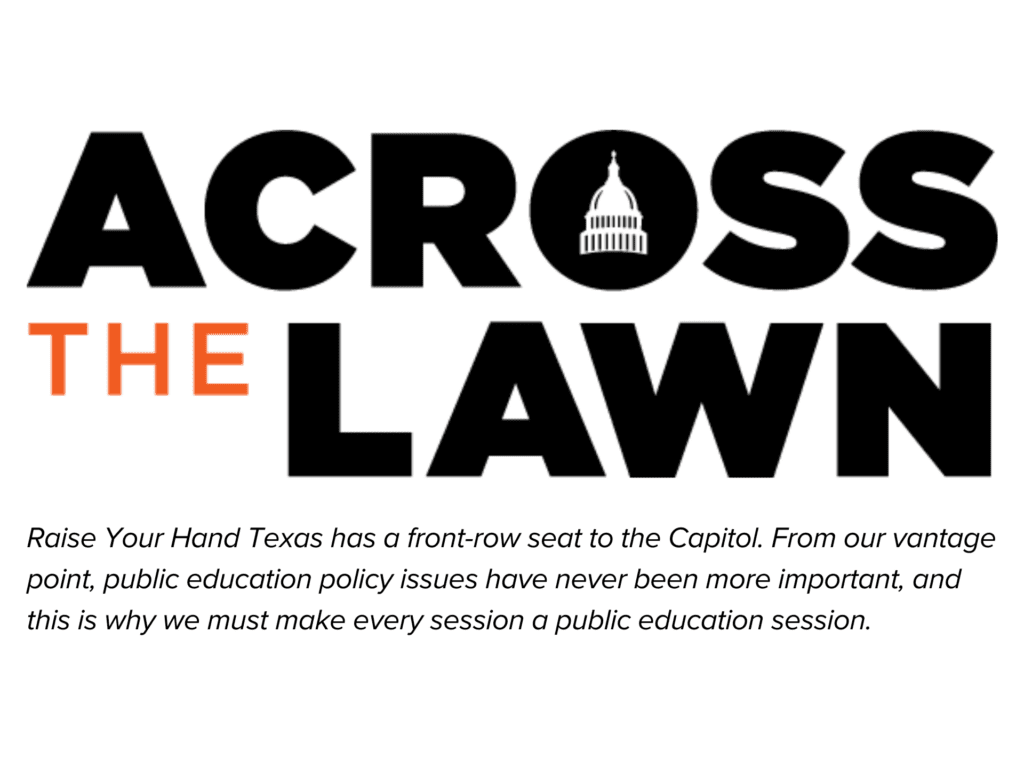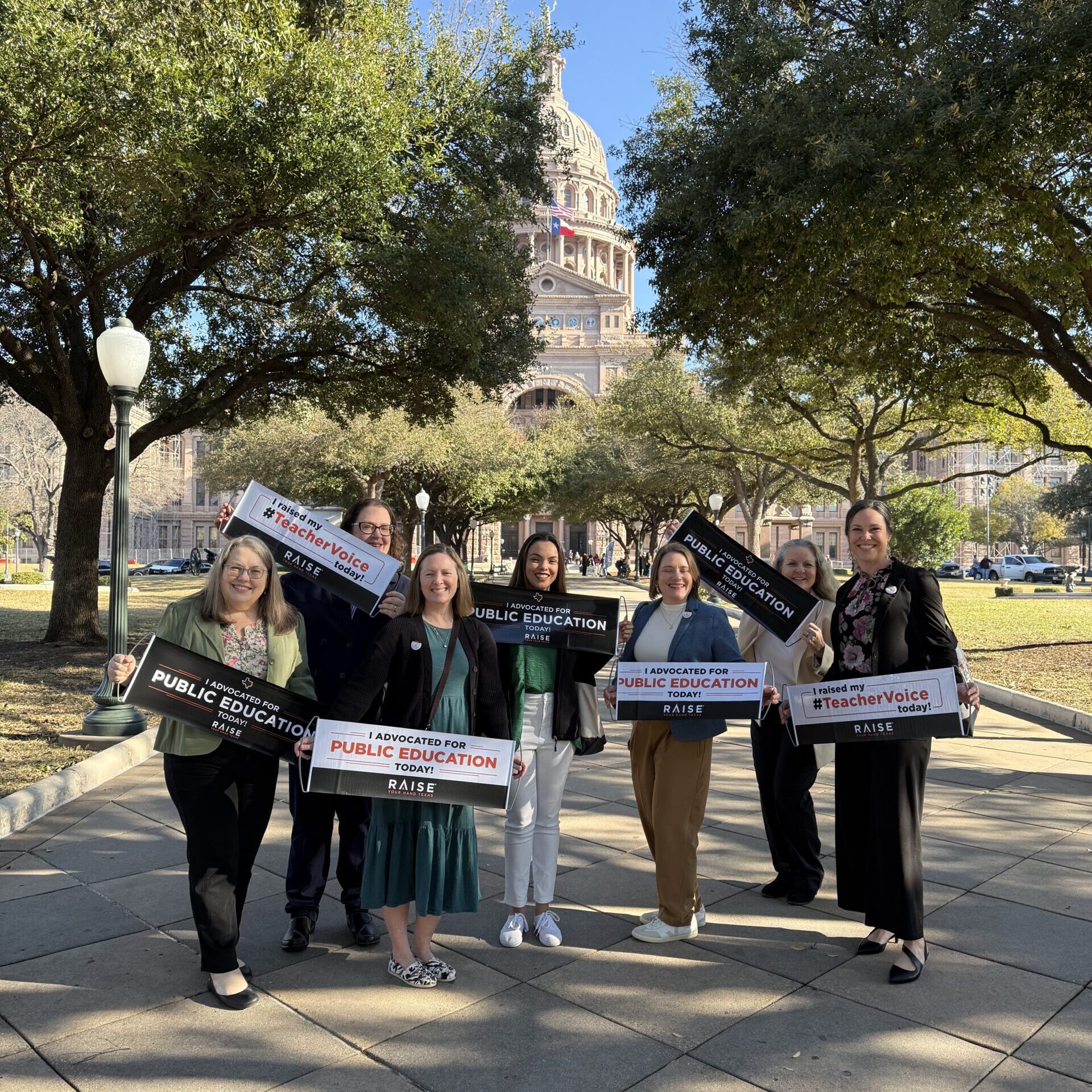
categories
Across the Lawn – March 28, 2025

March 28, 2025

One Thing to Do: Read and Share on Social Media
In this blog post, Our Public Schools and Teachers Are Counting on Texas Lawmakers, Raise Your Hand Texas breaks down select 89th Session bills that would impact school funding, and highlights exactly what lawmakers can do for public schools right now.
Four Things to Know:
1. House Committee on Public Education to Vote Next Week on School Funding and Voucher Bills, HB 2 and HB 3
Gov. Greg Abbott, Lt. Gov. Dan Patrick, and House Speaker Dustin Burrows held a joint news conference on Tuesday, March 25, to express their support for school choice legislation.
Gov. Abbott emphasized that making Texas the top state for education starts with passing school choice this session. Burrows pledged the House would finally pass an education savings account program, insisting it could be done alongside fully funding public schools. He expects House Bill 2 (HB 2) and House Bill 3 (HB 3) to clear the committee next week and reach the House floor soon after.
2. More Rules for Public Schools, Very Little for Voucher Program—Is That Good Policy for Texas?
The 89th Texas Legislature has spent the first half of the session engaged in shaping every aspect of public education policy. Over 1,200 public education-related bills were filed during this session. Lawmakers have examined a wide range of issues from school funding and student discipline to teacher rights, as well as parental rights, early childhood interventions (including literacy and math academies), and school safety. Countless hours of testimony have been given on how to manage our public schools, with each proposal adding to the already extensive Texas Education Code. Additionally, there will be long debates on state assessments, public school accountability, teacher certification issues, and more restrictive policies on how school districts can pass bonds for facilities to come. Not to mention, the continued property tax relief efforts that intertwine with school funding formulas.
At the same time, there is an ongoing push to create a universal voucher program, which would operate under a different set of rules than public schools. Unlike public schools, private schools that accept vouchers would not be required to follow many, if any, of the policies and accountability measures discussed at the Legislature. This raises important questions about fairness and transparency in how taxpayer dollars are used to support education.
As lawmakers continue to navigate these issues, it’s crucial to ensure that any changes to our education system strengthen all schools and provide every Texas student with the resources and opportunities they need to succeed.
3. Committee on Senate Education K-16 Hears Teacher Rights Bill, SB 27
The Committee on Senate Education K-16 heard 13 bills on Tuesday, March 25, including Senate Bill 27 (SB 27) by Sen. Creighton related to the rights of school educators. The bill includes the following provisions:
- Duty Calendar Requirement: School districts must provide teachers, full-time counselors, and librarians with a detailed duty calendar at least 15 days before the first instructional day, specifying workdays and supplemental duties.
- Teacher Contract Protections: The State Board for Educator Certification (SBEC) cannot penalize teachers who leave their contracts due to a serious illness (of themselves or their family) or relocation due to a spouse’s job change.
- Hiring Retired Teachers: The bill establishes a reimbursement grant program for districts, charter schools, and the Windham School District to offset increased retirement contributions when hiring retired teachers.
- Teacher Quality Assistance: The Texas Education Agency (TEA) must provide districts with technical assistance for teacher compensation, staffing strategies, and programs to encourage high school students to pursue teaching careers.
- Teacher Time Study: TEA will support districts in analyzing teacher schedules, non-instructional duties, and professional development to ensure educators have adequate time to complete job responsibilities.
- Teacher Position Data Collection: The TEA will collect detailed data on vacant teaching positions statewide to address teacher recruitment and retention challenges.
- Classroom Discipline Policies: Teachers can remove students from class for disruptions, abuse, or bullying; students cannot return without a written return-to-class plan unless a placement review committee determines otherwise.
- Student Removal Appeal Rights: Students removed from class can appeal their removal to the school’s placement review committee or the safe and supportive school team.
4. House Committee on Public Education Hears Parental Rights Legislation, HB 7
The Committee on House Public Education heard six bills on Tuesday, March 25, including House Bill 7 (HB 7) by Rep. Leach relating to parental rights in public education. The bill includes the following provisions:
- Parental Rights Document: The TEA must create and maintain a document informing parents of their rights regarding their child’s education.
- Employment Prohibitions Registry: Expands the TEA’s registry of individuals banned from working in education to include certain service providers.
- Dispute Resolution Facilitation: Requires the commissioner to develop a training and review program for dispute resolution facilitators and allows referrals for certain grievance cases.
- Grievance Policy Transparency: School boards must adopt, post, and provide the TEA access to grievance policies and procedures.
- Misconduct Reporting: Requires reporting of certain employee or service provider misconduct to the TEA.
- Educator Certification Suspension: Allows the SBEC to temporarily suspend an educator’s certification if they are arrested for certain offenses or pose an imminent threat to public welfare.



